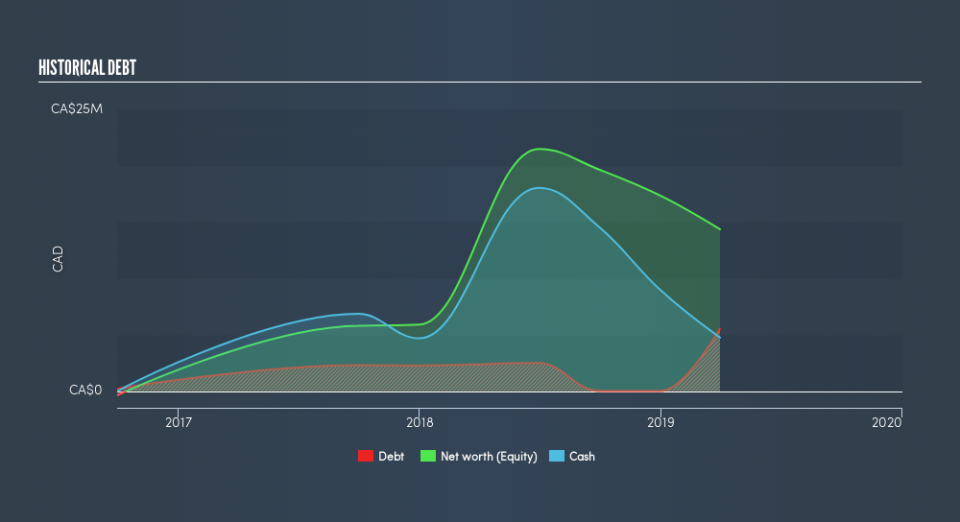Would James E. Wagner Cultivation (CVE:JWCA) Might Be Better Off With Less Debt

Warren Buffett famously said, 'Volatility is far from synonymous with risk.' So it might be obvious that you need to consider debt, when you think about how risky any given stock is, because too much debt can sink a company. We note that James E. Wagner Cultivation Corporation (CVE:JWCA) does have debt on its balance sheet. But the real question is whether this debt is making the company risky.
What Risk Does Debt Bring?
Debt is a tool to help businesses grow, but if a business is incapable of paying off its lenders, then it exists at their mercy. Part and parcel of capitalism is the process of 'creative destruction' where failed businesses are mercilessly liquidated by their bankers. However, a more frequent (but still costly) occurrence is where a company must issue shares at bargain-basement prices, permanently diluting shareholders, just to shore up its balance sheet. Of course, the upside of debt is that it often represents cheap capital, especially when it replaces dilution in a company with the ability to reinvest at high rates of return. When we think about a company's use of debt, we first look at cash and debt together.
Check out our latest analysis for James E. Wagner Cultivation
What Is James E. Wagner Cultivation's Debt?
The image below, which you can click on for greater detail, shows that at March 2019 James E. Wagner Cultivation had debt of CA$5.54m, up from CA$2.27m in one year. On the flip side, it has CA$4.76m in cash leading to net debt of about CA$787.4k.
How Strong Is James E. Wagner Cultivation's Balance Sheet?
Zooming in on the latest balance sheet data, we can see that James E. Wagner Cultivation had liabilities of CA$3.45m due within 12 months and liabilities of CA$6.82m due beyond that. Offsetting these obligations, it had cash of CA$4.76m as well as receivables valued at CA$1.41m due within 12 months. So it has liabilities totalling CA$4.11m more than its cash and near-term receivables, combined.
Of course, James E. Wagner Cultivation has a market capitalization of CA$54.5m, so these liabilities are probably manageable. But there are sufficient liabilities that we would certainly recommend shareholders continue to monitor the balance sheet, going forward. Carrying virtually no net debt, James E. Wagner Cultivation has a very light debt load indeed. When analysing debt levels, the balance sheet is the obvious place to start. But it is future earnings, more than anything, that will determine James E. Wagner Cultivation's ability to maintain a healthy balance sheet going forward. So if you want to see what the professionals think, you might find this free report on analyst profit forecasts to be interesting.
In the last year James E. Wagner Cultivation managed to produce its first revenue as a listed company, but given the lack of profit, shareholders will no doubt be hoping to see some strong increases.
Caveat Emptor
Importantly, James E. Wagner Cultivation had negative earnings before interest and tax (EBIT), over the last year. Its EBIT loss was a whopping CA$9.8m. When we look at that and recall the liabilities on its balance sheet, relative to cash, it seems unwise to us for the company to have any debt. So we think its balance sheet is a little strained, though not beyond repair. However, it doesn't help that it burned through CA$22m of cash over the last year. So in short it's a really risky stock. When I consider a company to be a bit risky, I think it is responsible to check out whether insiders have been reporting any share sales. Luckily, you can click here ito see our graphic depicting James E. Wagner Cultivation insider transactions.
If, after all that, you're more interested in a fast growing company with a rock-solid balance sheet, then check out our list of net cash growth stocks without delay.
We aim to bring you long-term focused research analysis driven by fundamental data. Note that our analysis may not factor in the latest price-sensitive company announcements or qualitative material.
If you spot an error that warrants correction, please contact the editor at editorial-team@simplywallst.com. This article by Simply Wall St is general in nature. It does not constitute a recommendation to buy or sell any stock, and does not take account of your objectives, or your financial situation. Simply Wall St has no position in the stocks mentioned. Thank you for reading.

 Yahoo Finance
Yahoo Finance 
